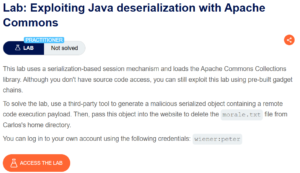Exploiting Java deserialization with Apache Commons

Descripción This lab uses a serialization-based session mechanism and loads the Apache Commons Collections library. Although you don’t have source code access, you can still exploit this lab using pre-built gadget chains. To solve the lab, use a third-party tool to generate a malicious serialized object containing a remote code execution payload. Then, pass this […]